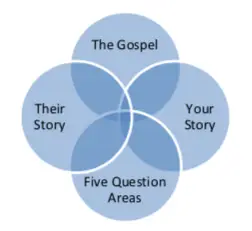Early in my ministry, I was invited with some of my friends to join them doing direct evangelism on South Street in Philly during Friday nights. Our conversation starter was a sign that read “Are you going to heaven? Free Test.” My friends would engage as many as possible with the gospel. I was just quietly searching for that one extended quality conversation. I wanted to sit down and really talk to someone about Jesus. On the drive home, my friends would vigorously debrief their numerous exchanges while I quickly fell asleep.
If you haven’t guessed, I was the introvert of the group.[1] My life has been a constant search for ways to share my faith that naturally feed off of my God-given personality and strengths instead of working against them. Adam McHugh says in his book Introverts in the Church, “I do not think that introverts are ill-suited for evangelism; I think that our prevailing evangelistic methods are ill-suited for introverts.[2]” Through this search, I have developed 11 keys to thriving as an introverted evangelist[3].
Know the Gospel
Knowing the gospel is an obvious prerequisite to sharing the gospel. But I’m not only talking about a saving knowledge of the life, death, and resurrection of Jesus Christ. That is foundational. But besides that, how well do you know the gospel? Introverts talk about things we know. The better and more confident we are with the gospel, the more likely we are to share it. As introverts, we have an excellent tool for helping us learn the gospel. Inside of our heads is a constant internal conversation processing our lives. Use this conversation to learn, review and rehearse the gospel until you are personally confident that you know it. Think it through regularly, and imagine different contexts where you can share it. Often in our minds, we are rehearsing for future conversations. Why can’t they be future gospel-centered conversations?
Show Up
This is otherwise known as incarnational ministry or being missional. Introverts are terrible at starting conversations with strangers, especially without context. Therefore, find a social context that turns non-Christian strangers into friends. Be savvy in choosing your context. For example, if you sing, maybe joining some type of school choir might be a good choice. But, would you rather be in a large 100-person university choir or in a smaller acapella group? That is dependent on your comfort level. Joining a social context like this gives me a handle on how to transition strangers into friends. This is especially important for introverted Christians. Because of the way we are relationally wired, it is entirely possible for us to find all of our significant connections within a Christian group unless we intentionally invest in a social context outside of our Christian bubble. This might mean that we have to say no to some Christian things in order to be relationally present in the lives of non-Christians. You may need to choose between that acapella group and the worship team.
Build Trust*[4]
Don Everts and Doug Schaupp, in their book I Once Was Lost, say that trusting a Christian is the first threshold of five that post-moderns cross on their journey to Jesus. Developing and maintaining a few trusting relationships is an introvert’s wheelhouse. This fits perfectly into who we are. However, we can become overprotective of our relationships, and as a result, talking about faith becomes a threat to be avoided. We must intentionally work through this because of the great opportunity these relationships present for the sake of the Kingdom.
Cultivate Curiosity
Becoming curious about faith is the second threshold. As introverts, our internal conversation is always reviewing previous exchanges with others. Use this process to recall what parts of your life others find interesting. What things about our story pique their curiosity? What questions are we always answering? What stories do we tell? You could even take a week to write down all the parts of your life that you talk about.
Is there a spiritual aspect to them? Can you tell them in a way that highlights a much deeper conversation for anyone who is spiritually curious? Not only do introverts review previous conversations, but we also rehearse future ones. Think through how you could answer some of your own FAQ’s in a way that deepens the conversation.[5]
Listen Proactively
 Introverts tend to be great listeners. Develop your listening skills and listen with a purpose. According to Tim Elmore, most young adults are asking questions in five major areas: Purpose, Lifestyle, Home or Belonging, Beliefs and Relationships.[6] As you listen to others, look for how what they are talking about connects with these areas. As you listen, use good questions to draw the conversations deeper. I work from the assumption that if God is prompting me to share the gospel with someone, then the Holy Spirit is already at work in their life preparing them to hear the Gospel. I listen and use questions to uncover where the Holy Spirit is at work. The five question areas give me a framework as I listen.
Introverts tend to be great listeners. Develop your listening skills and listen with a purpose. According to Tim Elmore, most young adults are asking questions in five major areas: Purpose, Lifestyle, Home or Belonging, Beliefs and Relationships.[6] As you listen to others, look for how what they are talking about connects with these areas. As you listen, use good questions to draw the conversations deeper. I work from the assumption that if God is prompting me to share the gospel with someone, then the Holy Spirit is already at work in their life preparing them to hear the Gospel. I listen and use questions to uncover where the Holy Spirit is at work. The five question areas give me a framework as I listen.
Search for Intersections

As you listen, you hear places where your story, their story, and the five question areas intersect. These intersections are primed for the gospel. These intersections might not necessarily be about the specific details but about the shared emotions. They might be talking about their roommates. You hear concerns about fitting in. This could be included in a sense of home and belonging that can be related to how through Christ we belong in the Kingdom of God. Or they could be talking to you about changing their major and you hear a lack of direction which leads you to share about how your faith gives you purpose.
Encourage Change
The third threshold is going from being generally curious of spiritual things to being open to changing your life because of what you are discovering. “Tell me about what you believe because I want to get to know you better,” is different than, “tell me about what you believe because I want to live a better life.” I have always believed that every young adult has areas of their life that they want to improve. I also believe that there are resources within the Christian faith that can help them make those changes. We don’t necessarily need to tell them they should change. With the gospel, we can help them change in ways that they have already identified.
Allow Space
Many of these keys build off each other and are linear. The next three really are not. Because so much about what we have been discussing in the context of a trusting relationship differs, the pace of the conversation can be unique. Pauses are allowed. “Let me think about that,” is a perfectly reasonable response, especially when we are talking about things of deep significance. The follow-up question “have you thought about it,” is just as reasonable and needed. The importance of the conversation should give us a sense of urgency; however, the extended nature of the relationship allows space for the conversation to not be hurried. When we don’t allow for space, we could force people to say no when they are legitimately still processing.
The corollary to this is also true. If they ask you a question that you are unable to answer it is perfectly reasonable to ask for time to find the answer. Within a trusting relationship, asking for time to find answers will not be seen as avoiding the question because they know you and know that they will have an opportunity to follow up with you. This may not be true for all introverts, but for myself, an introverted thinker, if you ask me a question it will be on my mind until I find the answer. My internal conversation will not forget about it.
Showcase the Community
One of the greatest demonstrations of the truth of Christianity is the unity within the body of Christ. At some point, your singular perspective should be bolstered by the community of believers. Multiple distinct and diverse voices united around the truth of the gospel are a powerful apologetic. An invitation to see this can and should happen whenever you feel it is appropriate. Although Sunday morning worship is always a solid choice, this may not be the best choice depending on the individual. The type of gathering I tend to invite others to is one where they will be able to connect with multiple Christians at one time and hear how the Christians are also following Christ. This does not necessarily need to be a formal event or program.
Highlight Jesus[7]*
As introverts, we often include ideas from others within our internal and external conversations. We are always referencing our favorite movies, songs, books, or quotes. There is a sense of validation when our internal thoughts correlate to an external source. We should do this with Jesus. As we are building trust, cultivating curiosity and searching for intersections, we should be highlighting Jesus in these interactions. Everts and Schaupp’s fourth threshold is the transition from being interested in general religious and spiritual things to focusing specifically on Jesus. If we have highlighted Jesus throughout our relationship, this transition should feel natural. When they cross this threshold, exploring Jesus through the Scriptures should really be a primary focus. The goal is for them to know enough about Jesus that they can make a decision to follow Him or not.
Give a Definitive Call
This last key is a hard one for introverts. It directly connects with the fifth threshold. Folks who are allowed to linger, exploring Jesus for an extended period of time, tend to regress back to a previous threshold and can regress all the way back to the first one of not trusting a Christian. At some point, you will have to engage your friend in a direct conversation asking them to transition from exploring Jesus to deciding to follow Jesus. Asking this direct of a question is often scary for an introvert to do within the context of a valuable relationship. We are afraid of damaging the friendships that are important to us. However, within our current culture, it seems that having a friend specifically ask you to follow Jesus in a pointed conversation is one of the most fruitful evangelism “strategies” that exists. When they know enough about who Jesus is and what Jesus has done, then it is appropriate for you to ask them directly if they want to decide to follow Him.
I hope that these 11 keys to thriving as an introverted evangelist are an encouragement to you. I sincerely believe that these will help you practice being a witness for Christ that truthfully connects to how God has made you. I also believe that in our current culture, introverts have the great opportunity for calling non-believers into a relationship with Jesus Christ. What better way to communicate the truth of a Triune God in an eternal loving relationship between the Father, Son, and Holy Spirit than through our own committed trusting relationships? What better way to talk about how Jesus came, died, and rose again so that we can have a restored relationship with God than through our own friendships?
[1] More information on the difference between introverts Introverts in the Church: Finding Our Place in an Extroverted Culture by Adam S. McHugh and Quiet: The Power of Introverts in a World that Can’t Stop Talking by Susan Cain or her TedTalk: https://www.ted.com/talks/susan_cain_the_power_of_introverts?language=en
[2] McHugh, Adam S. Introverts in the Church: Finding Our Place in an Extroverted Culture. (Downers Grove, IL: IVP 2017, 2nd Ed.)
[3]A good Scriptural study about the role of evangelists and evangelism can be done by comparing the audiences and contexts of Acts 1:8, Ephesians 4:11-13, 1 Peter 3:15-16 and Colossians 4:2-6.
[4] *The five keys that have and asterisk are directly linked to one of the five thresholds that Don Everts and Doug Schaupp define in their book I Once Was Lost. Everts, Don and Doug Schaupp. I Once Was Lost: What Post-Modern Skeptics Taught Us About Their Path to Jesus. (Downers Grove IL: IVP, 2008)
[5] This key is derived from I Once Was Lost but the suggested actions are taken mostly from Permission Evangelism by Michael Simpson. Simpson, Michael. Permission Evangelism: When to Talk, When to Walk. (NexGen, 2003)
[6] Elmore, Tim. Leveraging Your Influence: Impacting College Students for Christ. (Nashville, TN: Lifeway, 2003).
[7] This key is derived from I Once Was Lost but many of the suggested actions are taken mostly from Michael Frost’s video on Vimeo – Surprise The World – The 5 Habits of Highly Missional People – #3 Learn Jesus https://vimeo.com/19254248are






